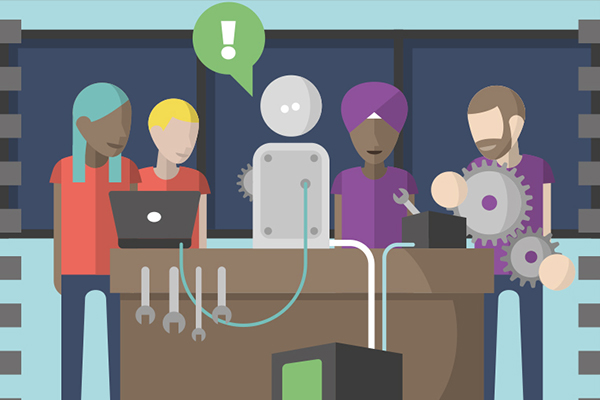A blog by Emma-Louise Boynton on opening up an inclusive dialogue with young people on the future of the economy.
In a recent blog post Matthew Taylor proposed that we begin to think about what a successful economy might look like in 2030 – an economy that could act as a facilitator rather than a barrier to human flourishing. If we are to create such an economy, at the heart of which principles of social justice might lie, then we need to start up an inclusive dialogue that doesn’t just welcome, but actively seeks out the involvement of young people from all backgrounds. To begin with, this means seeing political disengagement amongst this group not as a failure of individuals, but as a failure of politics.
Pink buses and hugging hoodies aside, politicians are failing repeatedly to make concerted efforts to communicate with young people and translate their policies in a way that is meaningful beyond the crumbling walls of Westminster. At present, everything from the terminology used when discussing economic policy, to the perceptible gulf that separates official rhetoric – the economic ‘recovery’ - and people’s lived experiences – rising inequality and in-work poverty - alienates people from the policy making process. This is particularly true for younger voters, who have borne the heaviest brunt of austerity measures as intergenerational inequality rises. Estimates for previous election turnouts suggest that whilst in 1964 there was little difference between the 18-24 and the over 65 voting demographics, by 2005 only 28 per cent of 18-24 year olds were voting compared with 75 per cent of over 65s, rising to 44% in 2010 compared to 76%. There seems little to suggest things will be markedly different this time around. For many, politics appears a zero-sum game.
Georgia Gould, Labour Party Councillor for Kentish Town and author of ‘Wasted’, recently spoke here at the RSA about why it is that today’s youth feels so disengaged with traditional politics. Speaking to young people across the UK she saw little of the apathy commonly attributed to the young and used to explain away their low turnout come election time. Instead, she found a wealth of anger, frustration and a deep-seated cynicism towards traditional political institutions. Whilst many of the young people she spoke to wanted to have more of a say over political decision making, they had little faith in the current levers of power. Expected to work for longer, for less, on often insecure and short-term contracts, it is little wonder young people feel that our increasingly archaic looking political system has little to offer them. Yet it is our future that is being shaped in the crib of heteronormativity and male-centricity that is the Westminster bubble. When a politician is forced to make ‘hard choices’ it is the voters most likely to turn up on polling day that are at the forefront of his or her mind, not those sticking two fingers up to ‘the system’ by their absence.
So this brings me back to Matthew Taylor’s blog on starting a debate on the economy. He suggests we begin by thinking about what sort of society we want to live in and how it is we are going to get there. We need a clear vision that is shaped as much by those who hold the reins of power today as by those who will be carrying it through into the future. And if the economy is the vehicle that is going to get us to this final destination then we need to start thinking about the sort of road marks and milestones that will tell us we are making progress. To begin with this means thinking about alternative ways of measuring growth and prosperity, ones that move us away from the fetishizing of GDP, which in counting all wealth created as ‘growth’ is a poor measurement for social prosperity and conflates the quality and quantity of this growth. Perhaps a better measure might be one proposed by Nick Hanauer and Eric Beinhocker who suggest measuring growth in terms of access to a ‘basket of solutions’ – things that improve people’s lives on a relative basis. Or perhaps we could learn from the Sen-Fittousi-Stiglitz Report produced in France, which advocated that new measures of wealth be considered alongside economic wealth – for example, social and ecological wealth.
A good place to start to debate might be to begin thinking about what a prosperous society looks like to us, individually. For me it is one in which men and women are valued equality in the workplace; in which all young people, regardless of their background, have the support they need to reach their full potential and utilize the opportunities presented them; and one in which work pays… but actually pays – this means raising the minimum wage to the living wage and ending the cycle of in-work poverty that has expanded over the past five years.
Whatever it is we decide defines our 2030 economy, and however we define the means for getting there, these are decisions that must be made collaboratively and inclusively in a debate in which young people are not just invited, but in which they are leading the discussion. This for me would hold the power for creating real and meaningful change.
Emma-Louise is Research Intern for Matthew Taylor and the Action and Research Centre. She tweets at @EmmaLouBoynton.
Related articles
-
Five insights into economic insecurity in the UK
Matthew Taylor
Economic insecurity is more widespread than many think.
-
Providing financial security for the self-employed
Garrett Cassidy FRSA
The safety net for workers net must be re-imagined in order to avoid the many dystopian predictions for our shared futures, says Garrett Cassidy.
-
Straws in the wind… which future of work are we heading for?
Rich Mason
As we launch our Four Futures of Work report, Rich Mason considers the seeds for each future scenario we can see in the world today, and the clues for which future economy we may be headed for.




Be the first to write a comment
Comments
Please login to post a comment or reply
Don't have an account? Click here to register.